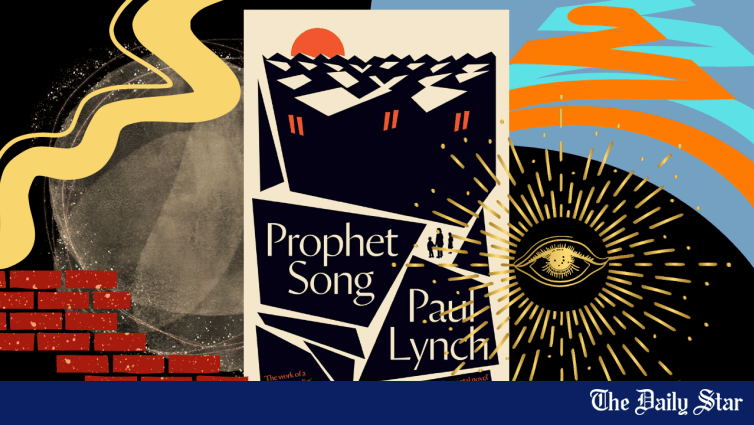Review of “Prophet Song” (Oneworld Publications, 2023) by Paul Lynch
Illustration: Maisha Syeda
“>
Illustration: Maisha Syeda
How many books have you read that made you cry? Since books are not as visual or audible as movies (not counting audiobooks), I think it takes an immense amount of effort for an author to delve into the deepest recesses of the human psyche and emotions and write a book that leaves the soul breathless, torn and scarred. As far as I can remember, the first book that made me cry was John Steinbeck’s Grapes of Wrath (1939). The next was Song of the Prophet by Irish author Paul Lynch, who won the 2023 Booker Prize.
Song of the Prophet is the harrowing story of Eilish Stack, a loving wife and mother of three sons – the youngest is barely a toddler – and a daughter. Her husband Larry is a teacher and also a senior member of the Irish Teachers’ Union. They seem like a perfectly normal family until the Garda National Services Bureau crosses their threshold and darkens their lives forever.
The 309-page dystopian novel is a haunting account of Eilish trying to keep her family from falling apart as everything around her collapses. We see and feel through her eyes the tension, fear, uncertainty, death and destruction unleashed by the state, the resistance of the rebel forces and her desperate struggle to stay sane. Reading the book was like watching Al Jazeera today, where every morning we see helpless Palestinian mothers beating their chests as they say goodbye to their children. Eilish symbolizes the mothers of the disappeared and the dead.
The book is a testament to the courage, unconditional love and resilience of women like Eilish. She represents women all over the world, regardless of race, religion, class, creed and colour, who try to protect their children until their last breath. Eilish is always on the go, caring for irritable teenagers, tending to their needs, breastfeeding a toddler, doing schoolwork, keeping food on the table, working as a microbiologist, caring for her father who is suffering from dementia and on top of that, facing hostile Garda officers. Wracked with guilt and blaming herself for the loss of her family members, she is on a desperate journey to put everything back to normal.
Lynch breaks all norms of punctuation and syntax, using walls of text that translate to the claustrophobic environment Eilish finds herself in. Some sentences are longer than a page, each line filled with a sense of urgency, helplessness, and a mix of intense emotions that leave the reader suffocating. Another notable point is the lack of quotation marks when characters speak; not even a separate line demarcates what another character is saying—it’s life flowing in organized chaos.
From the first page of the novel, vivid imagery is used as Eilish tries to be at peace with the approaching darkness of an evening. The pervasive dark and ominous tone is present throughout the book, almost taking shape and form; it creeps and sneaks into the Stack family home and follows Eilish everywhere. Her emotions take on wings as if they were not her own: “She looks up into the widening sky, searching for some kind of release, seeing her anger fly before her, watching it fly toward cold defeat.” There are other examples of such out-of-body experiences, making the book touch us on a deep level.
The theme of migration is secondary and is only prominently featured towards the end of the story. Several characters are against being driven out of their homes and we can identify with their dilemma. This perspective helps us understand the current situation, which makes us wonder why migrants risk their lives to cross the high seas in search of a better life. With the devil at our backs and the deep blue sea in front of us, the choice is clear.
This novel weighs heavily on the nerves and emotions. I had to put it down after a particular scene in the morgue as it was too overwhelming. The book is a thunderous account of a nation plagued by the Emergency Law and how it destroys people’s mental health and lives. It reduces them to a begging and groveling bunch, the luckier of whom find a way to leave the country but not without paying exorbitant sums to ruthless extortionists and being subjected to inhumane living conditions like we currently see in the refugee camps of Khan Younis. There is almost no relief in the novel except when Eilish learns about her father.
Song of the Prophet ends, but the story doesn’t. It belongs in the category of fiction, but to me it’s as factual as it can be.
Zertab Quaderi is an English SEO copywriter and social media and marketing consultant by day and reads both non-fiction and fiction by night. In between, she travels and does watercolor painting.




 Follow the Daily Star’s Google News channel for the latest breaking news.
Follow the Daily Star’s Google News channel for the latest breaking news.